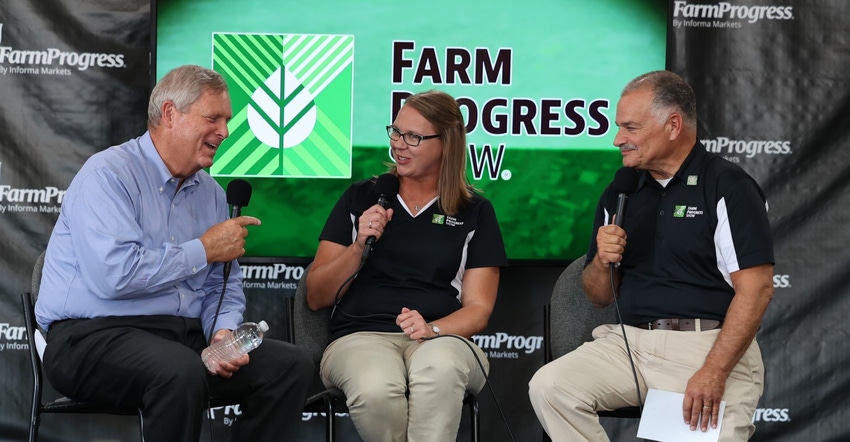
While speaking at the Farm Progress Show in Boone, Iowa, Secretary of Agriculture Tom Vilsack offered an early peak at pilot projects selected for USDA’s $1 billion in funds for use on evaluating climate-smart agricultural commodities. Vilsack remains optimistic about the many investments being made in rural America during the last two years to continue to create more markets for U.S. farmers and set the foundation for U.S. to lead the world on climate.
Vilsack says USDA continues to encourage the agriculture industry in getting to a net zero carbon emissions future by focusing on actions that are voluntary, farmer-led and recognizing and respecting private property ownership. The $1 billion for climate-smart commodity pilot projects is one way to encourage a different approach than that taken by the European Union, which by mandating how farmers must reduce emissions may also result in lower productivity.
“I think we’ll get to net zero, and I think we’ll get there without sacrificing productivity. And I think we’ll see better farm income, and I think we’ll see more jobs in rural places,” Vilsack says. “I think there’s a renaissance taking place.”
Vilsack says the combination of climate investments for the ag sector combined with the infrastructure investments that are going to be made not just on broadband but on roads, bridges, ports and locks and dam will give American agriculture “a competitive edge in terms of getting product to export markets.”
Climate-smart ag funding
Although full details will be released in mid-September, Vilsack expressed excitement for three selected projects including one with the Iowa Soybean Association in conjunction with PepsiCo, Cargill other partners to expand payments to farmers in 10 additional states, another with the University of Missouri to build climate resilient cropping and livestock systems and an additional highlighted project in South Dakota to quantify, monitor and verify carbon and greenhouse gas benefits associated with climate-smart agricultural practices for beef and bison.
The funds, available under USDA’s use of Commodity Credit Corporation funds, allow USDA to target projects that will help quantify and advance efforts to establish another income stream for farmers through the establishment of the climate commodities. Vilsack says an estimated 1,050 projects accounting for $18 billion in total funds applied for the $1 billion pot of money.
“And this is just the tip of the iceberg. You're going to see a significant number of projects awarded in September,” Vilsack says to those farmers in attendance.
Robb Ewoldt, president of the Iowa Soybean Association who farms near Muscatine, Iowa, explains the Soil and Water Outcome is a project that was started by the Iowa Soybean Association to reward farmers for combining actions that provide water quality initiatives and carbon sequestration. “It's been very successful in this first two years out. And we started growing this to work in multiple states,” Ewoldt says.
Ewoldt shares the selection of the project will be a great opportunity to encourage more farmers to adopt practices such as no-till and cover crops to receive the $35/acre payment. He can only qualify for the payments on new ground that hasn’t had conservation practices utilized because of additionality requirements from participating companies.
South Dakota’s project will partner with beef and bison producers to educate and guide producers on production practices that are most suited for climate-smart commodity markets, while also aligning those producers to voluntary carbon markets.
The University of Missouri project is focused on implementing diverse climate-smart practices in a way that helps build climate resilient cropping and livestock system to integrate crop and livestock production that also results in reduced fertilizer use.
Vilsack hopes Congress will take a look at what USDA is currently doing with the funding of the climate-smart projects to learn from it and see what’s happening in terms of the food system transformation effort as it looks to formulate the next farm bill.
He says it creates a tremendous opportunity for USDA to make an incredibly strong case for more new and better markets for investing in climate smart practices for continued investment in conservation, expanded capacity and competition, and for additional research.
“I think we are at an inflection point. We’re at a tipping point where I think the brightest and best days for American agriculture are ahead of us. They're not behind us. They're ahead of us. And I think we're going to see enormous opportunities come out of this,” Vilsack says.
About the Author(s)
You May Also Like






